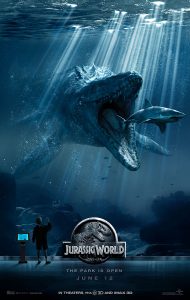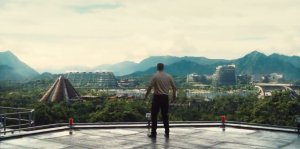As audiences go back to Isla Nublar for the second time with the release of Juan Antonio Bayona’s Jurassic World: Fallen Kingdom, a once disappointed Fletcher revisits Colin Trevorrow’s Jurassic World and this time finds much to admire.
On Sunday June 21st, 2015, Luke and I watched Jurassic World at Hammersmith Cineworld (don’t look for it, it’s not there anymore) and for two hours my fingertips never strayed far from my temples as I witnessed with aggravation, increasing distaste and occasional incredulity the third betrayal of one of Hollywood’s most exciting properties, another terrific opportunity squandered, the worst good film of the decade. “A film about cynicism made cynically”, I quipped. It became the third biggest motion picture of all time.
Three years have passed. Luke and I have discussed the film often. JP superfan Luke concedes, “Jurassic World is a film that hates itself.” Its failings are pronounced, and rewatching a work so joyless and decidedly callous was in prospect an unattractive task. For at least a year my pseudish pub soundbite remained, “Jurassic World is a film about cynicism.”
In 2017, I took the time to properly extrapolate the implications of my own verdict, and I discovered, with growing admiration, that Jurassic World is indeed a film about cynicism, in some very interesting ways. That its director, Colin Trevorrow, has wilfully authored a treatise on cynicism. That cynicism is its very theme. That once the blood has been hosed from Main Street and the fences are back up and humming, this tiresome monster mash, which found an audience vastly disproportionate to its merits to the unbelievable tune of $1.6 billion, is very clearly a self-reflexive work actively irritated and of active irritation, repelled by its marketplace and even by itself. It is the Indominus rex. Mr Walton, my dear Mr Littleboy. Welcome… to Jurassic World.
From first viewing, I was repelled by World’s prevailing mood of commercialization, heartlessness, insincerity and apparent self-loathing. It’s smart but it’s so, so disenchanted. Gifted a colossal professional opportunity during Hollywood’s vogue of handing mega-franchises to promising novices (cf. Marc Webb, Josh Trank, Ryan Coogler), unheralded indie filmmakers Colin Trevarrow and Derek Connolly seemed intent instead not to bite the hand that feeds but rather rip its arm off whole, slash open its belly, invite the world to watch its entrails cascade bloodily to the mud.
Twenty-five years ago, it was with majesty and wonder that Steven Spielberg and Sir Dickie welcomed us to Jurassic Park and simply put, we were as astonished as its characters – what Dennis Muren and his team presented had never been seen before. Here, the equivalent barnstorming introduction to the new safari functions as an unpleasantly sardonic facsimile – buzzing around his disaffected older brother Zach (Nick Robinson), exuberant pre-teen Gray (Ty Simpkins) runs to their hotel room window and throws open the curtains for the big reveal. The camera swoops and the score swells, but that bombastic theme now feels like a grim pastiche, a sarcastic cover version. The tone has been set: Jurassic World is determined to undermine itself.
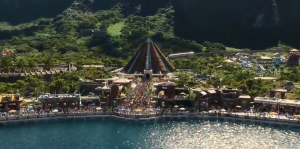
Cut to the lads’ aunt, corporate Claire (Bryce Dallas Howard), rehearsing her lines for the moneymen. She has the honour of dropping the iconic “Welcome to Jurassic Park”, but it’s deployed for a trio of executives from whom she hopes to extract a Verizon Wireless sponsorship deal for the Indominus Rex, “our first genetically modified hybrid.” The miracle of de-extinction is now a marketing opportunity. Procreation is a business decision, designed in a boardroom, implemented in a lab, actioned to produce a spike in attendance.
A defining image arrives early on, and it is the one which finally shakes Zach from his science phone trance – the Mosasaurus is fed a great white shark. The message, also relayed in the film’s metatextual poster campaign, is clear – jaded modern audiences don’t want to see Jaws, they want to see Jaws eaten by something even bigger. Cleverly, parts of this scene present the dino to the tourists as though they’re an audience in a cinema, surely another comment on consumers so alienated from first-hand experience that they comprehend reality best when it’s through a screen.
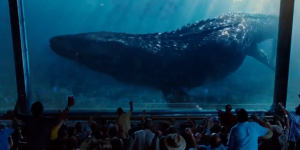
As we proceed, the filmmakers appear content for their work to coast by on goodwill for the original. The ironic call-backs stack up. In Jurassic Park, Nedry’s death by dilophosaurus was a dynamite set-piece; here, that demise is reduced to a Jimmy Fallon pratfall. Similarly, the iconic “When dinosaurs ruled the earth” banner is found in tatters underfoot and a moment later set on fire to be used as a torch.
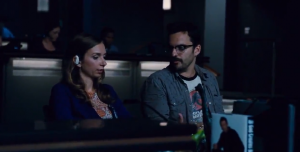
The climactic battle royale is just an absurdly escalated remake of Jurassic Park’s visitors centre showdown. Is this bastard to be its own film, or another 21st century post-modern masturbation, a procession of “It’s x from y and aren’t I clever for knowing it”? Jurassic World seems to regard both its progenitor and its own audience with disdain.
The malaise permeates the park’s staff. The visitors are happy but the employees are disaffected and distracted – like Claire’s assistant Zara (Katie McGrath) and control room button-pusher Lowery (Jake Johnson) – or comically miserable – the gawky Gyrosphere operator and his mournful refrain, “Enjoy the ride.” The only named characters having any fun are Gray, whose enthusiasm is positioned as childish and misplaced, and likeable but blithe CEO Simon Misrani (Irfan Khan), whose carefree outlook will soon be rewarded with an entirely unearned incineration in a helicopter crash.
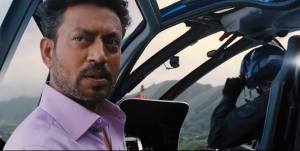
Across the opening quarter the familiar premise is cued up without significant invention and now we’re ready for the park to fall to shit. But Jurassic World’s commitment to traducing itself even extends to its first big kill – in a scene omitting tension or excitement, an overweight hard-hat lacking the personality to even credit the descriptive “bumbling” opens a door he shouldn’t and is swiftly gobbled up whole by a murdersaur.
Hold on. This is where it gets interesting.
First time out, I considered the guard’s death unfavourably in comparison to the fatality in the prologue of Jurassic Park. Both victims are the first big kills of their films, nameless workmen, inconsequential but for their roles – one’s a gatekeeper and the other activates a gate, both with disastrous results. Their purpose is to die, and in dying establish the film’s peril – technology will inevitably fail, and then you’re stuck on an island surrounded by nature that’ll eat you.
In the original’s prologue, Spielberg is intent on generating horror and no little sympathy as the worker is killed by inches, shot in close-up as Muldoon tries desperately to keep a grip on the man’s hand as the poor soul is yanked to his doom.
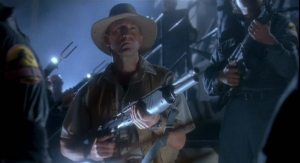
In Jurassic World, no such emotion is generated – after freeing the Indominus, the doofus extra sits like a pudding on the clearing floor, his forlorn glance to us the audience before being devoured basically a punchline to cue our whooping.
On second viewing, I realised what I should have twigged opening night – the glibness of the scene is calculation on the part of Trevarrow and Connolly. They’re green, certainly, but they know better than to attempt to recreate the original. As seen in World’s dud of a grand reveal of the park, these filmmakers are deliberately subverting the original, flipping meanings to reflect the themes of their Jurassic Park, just as Lowery’s original JP tee exhibits a distasteful pick-and-choose revisionism willing to ignore the catastrophe of the original park because Hammond’s “authentic” approach to bio-engineering was “legit”.
The death of the hardhat and the death of Zara, the latter character blameless and innocuous but nevertheless stooped and half-drowned by pterodactyls and then scoffed by a leviathan in a particularly vindictive kill, are prefaced by Claire’s earlier spiel to the investors – “Consumers want them bigger, louder. More teeth. We wanna be thrilled.” It seems to me that it’s with ingenuity and a streak of contempt for his public that a devilish Trevorrow is only too happy to comply with commercial pressures and give the consumers the pabulum for which they apparently clamour.
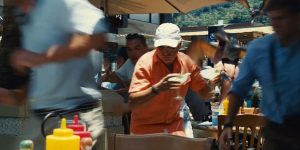
The first half of Jurassic World is a work of agitation hiding in plain sight. Trevorrow holds up a satirical mirror: textually, he parodies Hammond’s fantastical premise to show on one hand its anodyne Disneyfication and on the other its profit-chasing corporatisation. Wonder itself has had its naming rights sold and is served with a hot dog and a seven-dollar soda, while behind the scenes disaster capitalists plot to exploit the next crisis.
Meta-textually, Trevorrow mocks the blockbuster, mocks the franchise, mocks its presumed audience, providing the popcorn crowd with the brainless “bigger, louder, more teeth” excesses mandated by multinationals. He positively revels in its tawdry, crass results. The Indominus is his testament to this cynicism. It is a dinosaur-by-committee. It has no “natural” reason for being. An awkward amalgamation of desired attributes borne of focus groups and previous successes, it exists only to serve commercial opportunity. It is a sequel.
I’ll concede that Trevarrow and Connolly’s critique of the cynicism of blockbusters and the entertainment industry might go unnoticed because their film is itself a blockbuster, and one which seems relatively straightforward. Similarly, I recall that on release, Oliver Stone’s Natural Born Killers, a satire on entertainment’s preoccupation with violence, was itself accused of being too entertaining and too violent – Stone responded, “What did you want me to do, make a boring movie?”
But Trevorrow’s subtext is thorough and considered, full of little ideas which intelligently indicate the broader theme. One of my favourites is the brief insert of a petting zoo in which children ride baby triceratops like Shetland ponies. That the idea is salvaged from a passage in Michael Crichton’s original novel that didn’t make it past storyboard adds further satirical flavour.
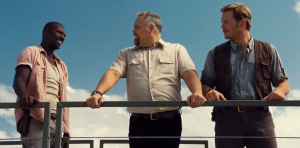
Jurassic World is relentlessly cynical, and often mocks insincerity by being insincere itself, which is the reason I was put off in the first place. But repeat viewings make it clear Trevarrow has equipped the piece with a slow burn emergence of its riposte – the numbing fog of disillusion created by consumerism and cynicism can be overcome through the rekindling of family.
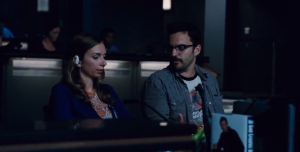
To serve this, up front we’re presented with individuals damaged and made cynical by their environment – Claire, ice queen; Zach, wounded; Hoskins (Vincent D’Onofrio), exploitative; and, the Indominus, unnatural. As their counterpoints, a set of socialised, emotionally available characters for whom connection and interaction is lifeblood – Gray, trainer Owen (Chris Pratt), and Owen’s ‘raptor pack of Blue, Charlie, Delta and Echo. To survive, the cynics must relearn the attributes exhibited by the optimists. Though emotionally damaged, Claire and Zach must defeat cynicism, accept filial bonds, drop their fences and submit to socialisation.
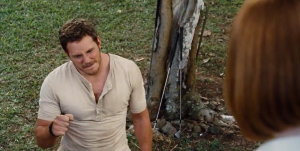
Careerist Claire begins the narrative scornful of family. She doesn’t know her nephews and doesn’t want to know Owen. She appears distant from her sister and speaks derisively of their mother. Through her control rooms and laboratories, dressed in white suit with a severe page-cut bob, she is coded as ascetic and abstinent, and in such frigid conditions the only life she can create is a twisted parody, the Indominus, a disturbed monster whose rampage reflects the obverse of her own uptight control. It’s a theme often visited in ghost stories and fairy tales, where repressed female id manifests as poltergeist or vengeful grotesque. So, Jurassic World presents two problems here – the Indominus must be destroyed and Claire must integrate.
The Indominus is the double of her mother. Both have rejected family (the Indominus ate its siblings), both acutely lack socialisation, both exist only to service profit. At the top of their respective food chains, both have the liberty to move freely through the island. (Crikey, as the plot kicks off, these two are even the same colour!) Claire is the alpha, and her Indominus the abused child desirous to usurp her.
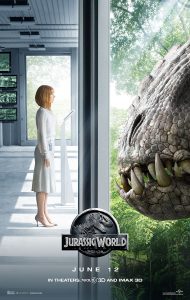
Claire’s nephew Zach has desensitised himself with apathy as an emotional defence from his parents’ impending separation. At the outset, he has self-isolated, unwilling to feel – he shirks his girlfriend’s affections and sleepwalks through the introduction of the resort, headphones in, head down, interested by nothing. He reduces his divorcing parents’ worth to their value as commercial transaction – “You get two of everything” – and pretends maturity means deserting family – “Whatever. You know what – doesn’t matter. I’m gonna be gone in two years anyway. All my friends’ parents are divorced. There’s a point you have to grow up.”
InGen’s chief of security Hoskins is our hissable baddie. When he observes the relationship between Owen and the velociraptors – “I just saw a bond, a real bond, between man and beast” – he immediately argues to weaponise it, and as an audience we’re encouraged to be repulsed by his worldview. But Hoskins is right – in the wider context of Masrani’s portfolio the only likely purpose these assets could serve is deployment in defence. The intelligence of the ‘raptors makes them too dangerous for exhibition and it’s not plausible these animals were created on a whim. Owen says, “You made them and now you think you own them” and Hoskins retorts, “We do own ‘em.” In the cynical world Trevorrow presents, the cynical Hoskins is entirely correct.
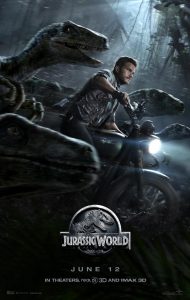
As control is lost, the only way to survive is to reject corporate ideologies and prioritise family. Zach and Gray grow closer as they shake off the restraints of Zara’s cellphone and tablet, and they begin to rekindle properly the minute they go “off road”, away from the screens and commercial concerns that drive a wedge between people and stunt positive human interaction. Note how Zach’s own phone almost gets them killed and is then discarded altogether. By the time of the Indominus hunt, their connection has grown to symbiosis, as together they activate and wield the cattle prod against the pouncing ‘raptor. Zach’s attitude has changed from “I’m gonna be gone in two years” to “We’ll always be brothers and we’ll always come back to one another.”
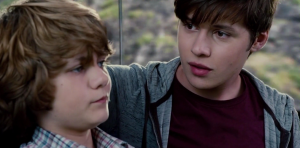
Similarly, at the climax the group survives thanks to Owen’s carefully cultivated relationship with his dino brood. Note how Owen reestablishes respect by removing Hoskins’ hi-tech hackamore, a shackle representing both InGen’s perversion of nature and technology as barrier to emotion. Bond reasserted, the ‘raptors then pledge loyalty to Owen, fighting and dying for him. The corporate giant that is the Indominus can only be beaten through responsible social alliance, a sort of park keeper-dino tag-team, as the monster is dispatched by a succession of Owen, Claire, ‘raptor, Rex and Mosasaur.
I’d like to iterate that in dramatic execution, these scenes, though capably shot, are as ludicrous as they sound. I don’t know what level of cinematic dexterity could render successfully the stupid sudden saves-the-day appearance of a giant fish to fucking eat the baddie.
But I can’t overlook that at every high-heeled step, Jurassic World’s creators have embedded their themes thoroughly. Even in this farrago of a climax, the intervention of the Mosasaur can be considered as an intentionally ironic pastiche of the saviour Rex at the end of the Jurassic Park, perhaps in juxtaposition even retrospectively questioning the validity of that denouement.
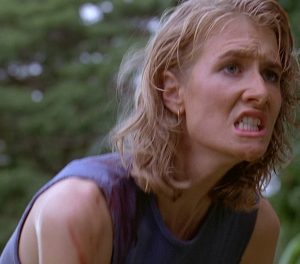
At the same time, even as in its climax the film is perhaps drawing attention to its own artifice and perhaps affectionately mocking the original, it is by this point foregrounding its positive rejoinder, still presenting a hopeful, even romantic message.
Lowery began the piece as the quintessential hipster snide – jeering ineffectually from the sidelines with sarcasm and criticism but lacking the courage to solve problems. By film’s end, he has chosen to be the hero – “Someone has to stay behind” he announces with self-knowing stoicism before moving in for the cliched clinch with Vivian (Lauren Lapkus).
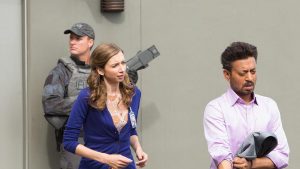
That scene’s tone is comic but nevertheless, Lowery’s choice to embrace duty was heroic, and that’s where we leave him, at his post, resolute, a stronger person for his contribution to the collective. (As it happens, I reckon Lowery and his 150-dollar second-hand t-shirt function as a knowing, and even exculpatory, representation of Trevorrow himself.)
In the hangar with the survivors, the film’s closing dialogue. Claire asks, “So what do we do now?” Owen’s response is wry but again speaks to the central argument of the natural imperative of family and collective: “Probably stick together – for survival.”
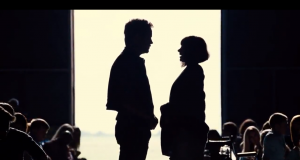
And last, the final image, at first sight trite and misplaced but on reflection romantic and thematically resonant. At the cinema it felt like a self-satisfied call-back to the Rex’s deafening roar in the visitors centre at the end of Jurassic Park, another example of World cynically trading on nostalgia.
On third viewing, I realised it’s a smart replication of an earlier scene in which Hoskins ascends the helipad. Misrani is dead and the island is in chaos – Hoskins’ “opportunity” is presenting itself, and he surveys the park grinning as in coronation. It seemed corporate exploitation had won. But as we close, Hoskins has been eaten, cynicism has been vanquished, corrupting science has been banished and nature has prevailed. The park belongs to its animals. The new alpha, same as the old alpha – the Rex.
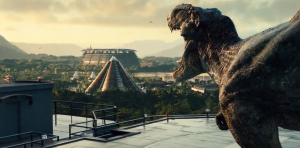
Further reading:
You can listen to our podcast that celebrates Spielberg’s impact on the franchise as a whole: Jurassic Park’s Sequels: How Do You Solve a Problem Like Crichton and Spielberg – The Electronic Labyrinth Podcast
Luke writes about Why Jurassic Park Isn’t Really About Dinosaurs
Fletch celebrates the craft of Spielberg’s original classic in Many Sensational Shots – Capturing Jurassic Park
Luke and Fletch review Fallen Kingdom on The Electronic Labyrinth Podcast
